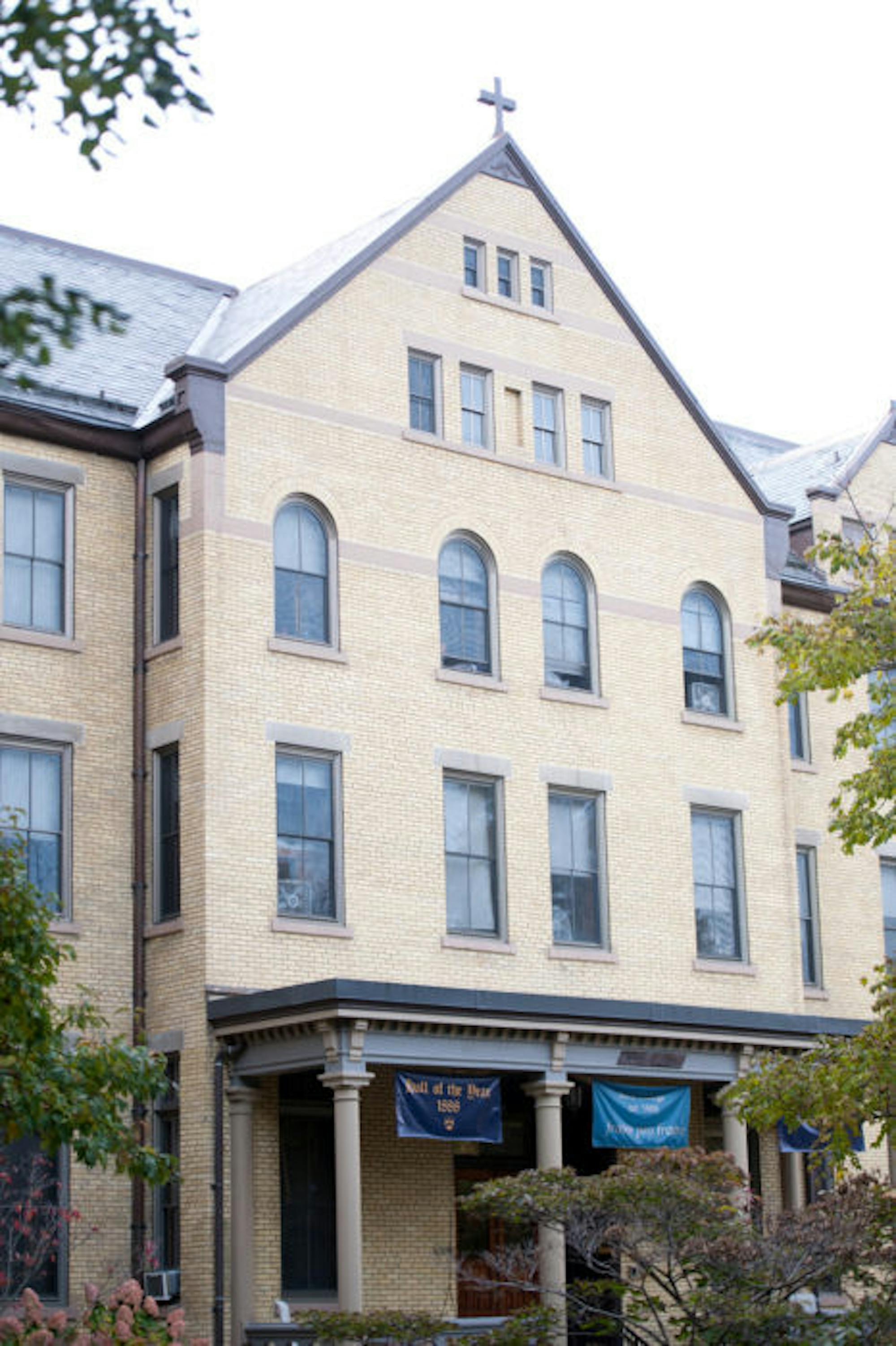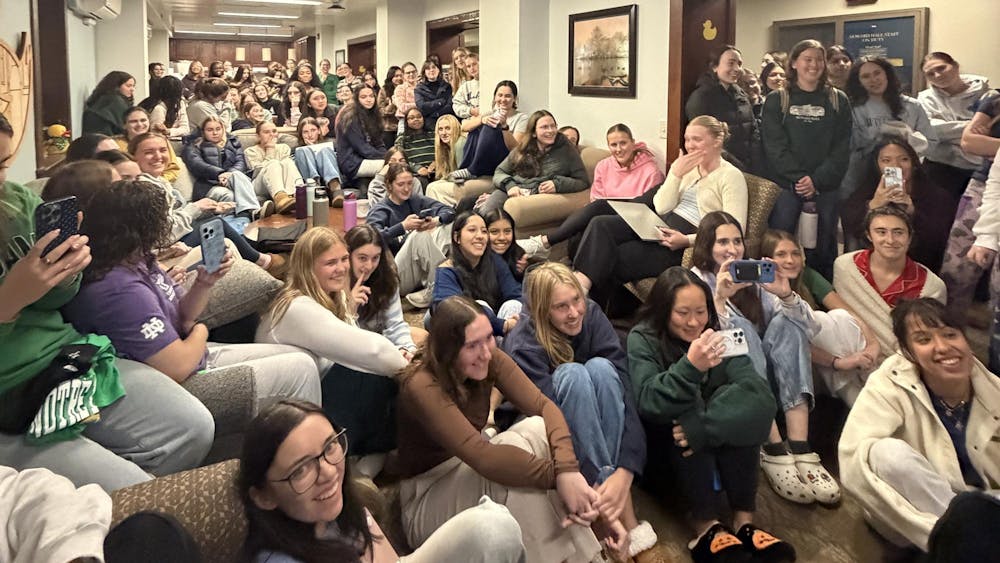While Sorin College has been standing on God Quad for well over 100 years, for a short period of time in 1969, in protest of the Vietnam War, the dorm did not consider themselves to be a part of the University.
Declaring themselves no longer Sorin Hall, but Sorin College, the students who lived in the turreted dorm seceded from the University and proceeded to bring in professors to teach and hosted their own classes. Today, the secession is commemorated by a banner that hangs over the porch declaring Sorin College “College of the Year — 1969.” Next to this, another banner which dubs Sorin College “Hall of the Year — 1888.”
“There’s probably many versions, but what I think is probably the thread through all the versions is that it was a protest against the Vietnam War, sort of an activist kind of event by members of the dorm,” Fr. Bob Loughery, Sorin College’s rector, said. “They felt like by saying they were Sorin College, they were seceding from the University, which never happened, but Sorin College stuck.”
“Father Hesburgh handled it just right,” Fr. Edward “Monk” Malloy, former University president and Sorin resident for 39 continuous years, said. “He didn’t do anything. He didn’t say you can’t do it. He just didn’t recognize it. And so they put up the sign on the porch, ‘Sorin College’ and got a little publicity. And then that’s all it was. Nothing else happened.”
Junior Mark Spretnjak said the secession was motivated by a desire for activism by the Sorin community.
“I talked to Fr. Bob, our rector, a little bit about it … and he pointed out the history of activism,” Spretnjak said. “It was an activist thing, it was because of the war in Vietnam. The involvement in, not only the community, but just helping people still. He pointed out that you can still feel [the spirit of activism] very strongly.”
“I think just knowing that there was a time when people felt strongly and passionately about a cause, they would do what they could to raise awareness,” Loughery added. “So that was their way to speak out against the war.”
The spirit of activism and service is still present in Sorin’s celebration of the secession. Each year, Sorin commemorates the secession for a week in April each year, often incorporating some form of service, Loughery said.
This year is a landmark year, as Sorin will be celebrating its 50th anniversary of its secession from the University. In addition to the usual festivities, the dorm has also designed t-shirts commemorating the secession.
The festivities include a cookout on Monday, paintball on Tuesday, a poker night with cigars on Wednesday, a talent show on Thursday and Sorin College’s formal on Friday at the South Bend Cubs stadium, where the residents of the dorm and their dates will enjoy a private ballroom while they watch the game, as well as fireworks later in the night.
Regardless of how Sorin celebrates the week, Sorin’s residents enjoy the chance to connect with their history that the week provides.
“It gives us an opportunity to connect to our ancestors and our traditions,” freshman JaeYoung Chang said.
“I think at this point, it’s a fun piece of history and it’s giving us an excuse to bond over the week and care about school a little less and kind of just join up together and have a good time,” Ryan Burns, a sophomore and former president of Sorin College, said. “The history still matters to a fair amount of us in the dorm, especially because it’s been 50 years now.”
Sorin has a number of unique traditions, including Sweater Vest Fridays, when residents wear their Sorin sweater vests to a communal meal once a month in the dining halls. Traditions also include rubbing the toe of a statue of Fr. Sorin in the entrance of the dorm every day for good luck. That same statue has also been transported around the world to numerous locations, such as Big Ben, the Eiffel Tower and even came down from a helicopter during a football game. The dorm’s small size has contributed to its anomalous culture, freshman Andrés Dávalos said.
“Since we’re such a small dorm, the sense of community here is huge,” Dávalos said. “I also feel like [the secession] is very representative of Sorin’s traditions and culture. There is no other dorm that would secede from the University that’s not a dorm that has a culture like Sorin.”
Malloy said Sorin’s location at the center of campus causes them to have a sort of notoriety.
“I describe Sorin as like living in Switzerland, because when the first snowball fight happens and the two quads are fighting each other or when orientation takes place and all the dorms are running around chanting their names, we don’t do that, because everyone knows who we are eventually,” Malloy said.
From the first moments students are on campus, Sorin establishes itself as an independent community, approaching Welcome Weekend activities with a relaxed attitude, Spretnjak said.
“During Welcome Weekend … it gets late at night and you’ll see Keenan guys running around lead by their captains and they come sprinting through and chanting stuff and making huge fools of themselves and we’re all just out back smoking cigars like, ‘Oh my gosh, isn’t it great not to have to do that.’ You get the early sense of the relaxed vibe to Sorin,” Spretnjak said.
“We are kind of secluded from the rest of the University and we like to be just us and not have to deal with anyone else’s stuff. We’re a part of our own thing,” Burns added.
This year, the “brotters” — short for “bro-otters,” a nod to the otter, which is the hall’s mascot — are embracing their strong community spirit and unique history to have fun and reflect on the secession.
“Secession Week is also kind of a reminder to everybody that you can do things; you can make change. Everybody else on campus that year, nobody else seceded,” Spretnjak said. “I like to think that something about Sorin, a spirit of Sorin where the guys who are living here realize that the war was going on, people weren’t happy about it and they realized like it’s not an issue of crying of spilled milk, there’s something that you can still do about these things.
I read something the other day that Hesburgh kind of took a hands-off approach, which is nice to see. The administration, you know, they always have to make a choice one way or the other … But something I admire that Hesburgh did is that he saw this was happening and he let it happen; he let the students speak for themselves and do what they thought was right.”
While the secession happened 50 years ago, Sorin residents are still proud of their rebellious history.
“Let’s secede again,” Sean Burns, a freshman and Sorin resident, said of the secession. “We don’t want to be a part of this school. We don’t like the rest of this school. We kind of just want to be ourselves, and let’s secede again.”
Read More
Trending









